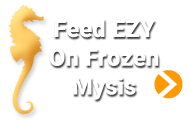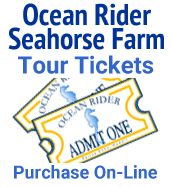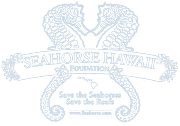Ocean Rider Seahorse Farm and Tours | Kona Hawaii › Forums › Seahorse Life and Care › early hydroids
- This topic has 1 reply, 2 voices, and was last updated 13 years, 9 months ago by Pete Giwojna.
-
AuthorPosts
-
November 2, 2010 at 1:57 am #1846ocean17Member
We have had some successes in raising H. Reidi seahorses in recent months. Lately we have had a hydroid infestation on some of the older stock and after treating they got better but then all quit eating and slowly dwindled away. We now have a new batch in the kreisel and have already notices tiny hydroids dotting the inside of the acrylic. My question relates to how soon you can treat these babies? They seem awfully fragile for the treatment. Any words of wisdom are always appreciated.
We are also just now starting our artemia decapsulation, which we understand is one of the ways your water gets the hydroids in the first place.
As far as us loosing that oldest batch we think it’s mainly related to how long we kept them on artemia and didn’t get them switch over to prepared foods until they were like 90 days old.
November 2, 2010 at 5:43 am #5209Pete GiwojnaGuestDear JD:
Congratulations on your success raising your challenging Hippocampus reidi fry!
I am assuming that you have been using fenbendazole (brand name Panacur) in granular form in order to eliminate the hydroids from your kriesel nurseries. Fenbendazole (brand name Panacur) is an inexpensive anthelmintic agent (dewormer) used for large animals such as horses, and the de-worming granules can be obtained without a prescription from stores that carry agricultural products (e.g., farm and ranch equipment, farming supplies and products, veterinary supplies, livestock and horse supplies, livestock and horse feed). If you live in a rural area, those would be good places to obtain it as well. Look for Panacur granules that contain 22% fenbendazole.
The recommended dose for newborn seahorses in nursery tanks is 1/16 teaspoon of the horse dewormer granules (22.2% fenbendazole) per 10 gallons of water. Dose aquarium with 1/16 teaspoon/10 gallons every other day until you have administered a total of 3 such treatments (Liisa Coit, pers. com.). Even one dose will usually do a fine job of eradicating worms of all kinds, but Aiptasia rock anemones and hydroids are a bit tougher and may require 2-3 doses to eliminate entirely. That is the same dosage of fenbendazole granules that is recommended for treating dwarf seahorses and their fry, JD, and I have had no reports from home breeders indicating any adverse side effects among the ponies or their offspring when fenbendazole is used at the recommended dosage…
There are a couple of things you should keep in mind when treating an aquarium or nursery tank with fenbendazole, JD. Administering a regimen of fenbendazole (FBZ) or Panacur will eradicate any hydroids, Aiptasia rock anemones, bristleworms, or roundworms (e.g., nematodes) from live rock or live sand, thereby rendering them completely seahorse safe.
Because fenbendazole is essentially a de-worming agent, it will destroy any bristleworms, flat worms, roundworms or nematodes, spaghetti worms or the like. Unfortunately, this includes desirable worms such as featherdusters, tubeworms, Christmas tree worms, or fanworms as well..
Fenbendazole does not have any adverse effects on biological filtration, but be aware that it is death to many Cnidarians besides hydroids. Mushrooms and related corals are generally not affected, but expect it to have dire effects on other corals (e.g., sinularias), polyps, gorgonians, and anemones. In general, any Cnidarians with polyps that resemble the stalked family of Hydrozoans are likely to be hit hard by fenbendazole, so don’t use this treatment in a reef tank!
Also be aware that fenbendazole seems to soak into the porous live rock and be absorbed indefinitely. I know one hobbyist who transferred a small piece of live rock that had been treated with fenbendazole (Panacur) months earlier into a reef tank, where it killed the resident starfish and Astrea snails. So enough of the medication may be retained within treated live rock to impact sensitive animals months after the fenbendazole was administered. Don’t treat live rock intended for reef systems with fenbendazole (Panacur)!
At the lower dosage recommended for nursery tanks and dwarf seahorse tanks with fry (1/16 tsp. per 10 gallons), fenbendazole normally does not harm cleaner shrimp and decorative shrimp. With the exception of Astrids (Astrea), Coit and Worden have found it does not usually affect the types of snails typically used as cleanup crews (e.g., Nassarius, Ceriths, and Nerites). It will kill starfish but copepods, hermit crabs, and shrimp are normally not affected.
Macroalgae such as the feathery or long-bladed varieties of Caulerpa or Hawaiian Ogo (Gracilaria) are not harmed by exposure to fenbendazole at even triple the normal dose. In fact, if you will be using Caulerpa in your nursery tanks to provide hitching posts for the fry and serve as a form of natural filtration, it’s a very wise precaution indeed to treat them with a regimen of fenbendazole beforehand.
So fenbendazole (FBZ) or Panacur is primarily useful for ridding bare-bottomed nursery tanks and dwarf seahorses setups of hyrdroids and Aiptasia anemones, ridding Caulerpa and other macroalge of hydroids or Aiptasia before its goes into the aquarium, and cleansing live rock of bristleworms, hydroids, and Aiptasia rock anemones before it is introduced to the aquarium.
It can also be used to eradicate bristleworms, roundworms/nematodes, hydroids, an Aiptasia from an established aquarium if it does not house sensitive animals such as live corals and gorgonians, starfish, certain snails, or tubeworms and other desirable worms that may be harmed by FBZ, providing you monitor the ammonia levels closely and are prepared to deal with the ammonia spike that may result from the sudden death of the worm population.
When it comes to snails, Nerites, Ceriths, and Nassarius snails are not affected by the medication and can remain in the aquarium during and after treatment with fenbendazole.
On the other hand, Trochus or turbo snails, Astrea snails, and especially Margarita snails are sensitive to fenbendazole/Panacur and should be removed from the aquarium until the treatment regimen has been completed and the fenbendazole has been pulled from the aquarium using activated carbon and/or polyfilter pads for chemical filtration.
Okay, JD, that’s the rundown on controlling hydroids with fenbendazole or Panacur.
Yes, indeed, decapsulating brine shrimp cysts has been reported to significantly reduce the incidence of hydroid infestations. It is also very important to completely sterilize and air dry the kriesel nurseries between every use.
Best of luck reading your nursery tanks from hydroids, JD.
Respectfully,
Pete Giwojna -
AuthorPosts
- You must be logged in to reply to this topic.





